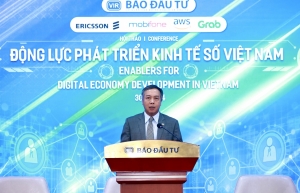INTERNATIONAL INVESTMENT
AND PORTAL
Preparations are gearing up in Vietnam for 5G commercialisation. What do you forecast about the development of Vietnam’s digital economy when it is commercialised?
 Khanh Nguyen, vice chairman of the Digital Sector Committee under the European Chamber of Commerce in Vietnam
Khanh Nguyen, vice chairman of the Digital Sector Committee under the European Chamber of Commerce in Vietnam
The commercialisation of 5G in Vietnam is expected to be a catalyst for significant growth and transformation in the country’s digital economy.
It is anticipated that with superior connectivity and high-speed data transfer capabilities, 5G technology will accelerate digital transformation in Vietnam by enhancing connectivity and enabling the proliferation of Internet of Things (IoT) devices, which will drive innovations across sectors like agriculture, manufacturing, healthcare, and smart cities. It will fuel the growth of e-commerce and open new economic opportunities in digital services and content creation.
Manufacturing will benefit from smart factories and optimised supply chains, while public services will improve with advancements in e-government, healthcare delivery, and education. Overall, 5G will play a pivotal role in advancing Vietnam’s economy and infrastructure.
Its significant impacts are highlighted by the National Institute of Information and Communications Strategy Report, which predicts that 5G will contribute approximately 7.34 per cent to Vietnam’s GDP growth by 2025.
What sectors and industries will benefit most from 5G commercialisation?
5G technology, with its promise of ultra-high speeds, low latency, and massive connectivity, is poised to revolutionise numerous industries. As Vietnam embraces 5G to become a digital economy, the telecommunications sector stands to benefit significantly from enhanced mobile broadband and a wide range of IoT applications.
In urban development, 5G will enable smart cities by improving transportation, public safety, and environmental management systems, while enhancing public services like e-government and online education. The agriculture sector can leverage 5G for precision agriculture and smart farming, optimising resource use and increasing efficiency.
Tourism will also benefit from enhanced virtual and augmented reality experiences that improve connectivity and visitor engagement. The education sector will see advancements in online learning and virtual classrooms, providing broader access to educational resources. Additionally, financial services will benefit from 5G’s improved security and speed, enhancing mobile banking, digital payments, and fraud prevention.
Among the most recent applications of 5G in commerce in Vietnam, in July 2023, Viettel announced the successful trial of a private 5G mobile network service for the Pegatron factory in the northern port city of Haiphong – the first smart factory in Vietnam to be automated using 5G connectivity, featuring high-speed, low-latency, and support for multiple connections.
What sufficient conditions are needed for Vietnam to make breakthrough developments in the digital economy?
Achieving a breakthrough in Vietnam’s digital economy could benefit from several key conditions. Robust infrastructure is important, including widespread high-speed internet connectivity, reliable digital infrastructure like data centres, and investment in 5G and emerging technologies. Human capital development is also vital, with a focus on STEM education, digital literacy, talent development, and fostering entrepreneurship and innovation.
Supportive government policies can help by providing clear digital economy regulations, reducing bureaucratic hurdles, protecting intellectual property rights, and investing in digital government services.
Developing a vibrant digital ecosystem involves encouraging startups, fostering collaboration between businesses, government, and academia, and creating an environment conducive to digital innovation. Additionally, traditional industries might be encouraged to adopt digital technologies, with an emphasis on promoting e-commerce, digital payments, and advancing sectors like digital agriculture and smart cities.
Ensuring robust cybersecurity measures and strong data privacy regulations is important for building trust and protecting digital assets. International integration through attracting foreign investment, participating in global digital trade, and collaborating with other countries could also play a significant role. Among these factors, innovation in management awareness through institutional support might be a key aspect of implementing digital economic development.
Europe has become a key player in the global digital economy due to several factors, including a strong foundation in research and development, data privacy, consumer protection, and advanced digital infrastructure. A culture of innovation and entrepreneurship, along with collaboration and standardisation, has further contributed to its success. Notably, the digital age is one of the European Commission’s top priorities, with the 2030 Digital Compass outlining a plan for the EU’s digital transformation.
Vietnam should learn from Europe’s example by adapting these lessons to its specific context to accelerate its digital transformation. Vietnam should focus on improving policies and institutions to attract digital technology investments and facilitate business activities such as capital contributions and mergers. The government should provide businesses with clear guidelines and financial resources to support digital transformation, emphasising sectors that can leverage international trade agreements and local strengths.
How can stakeholders work together to strengthen digital ecosystems, thus contributing to Vietnam’s digital economy development?
With the current growth rate, Vietnam’s digital economy could reach the target of 20 per cent of GDP by 2025. To achieve this goal, coordinated efforts from government agencies, businesses, and citizens are essential in promoting digital transformation and integrating IT across all sectors of economic and social life.
Following the directive to promote national digital transformation; develop the digital economy on a foundation of science and technology and innovation, and to effectively implement the policies and tasks outlined in the documents of the 13th National Party Congress, a coordinated approach involving several key solutions is required.
To strengthen the digital ecosystem, the government can launch educational campaigns to raise public awareness of digital transformation and the digital economy through the media and social platforms. Additionally, it can enhance legal frameworks by regularly updating laws will support digital transformation and encourage innovation and new business models.
Strengthening cybersecurity with clear data protection policies is crucial for ensuring secure online environments. Investing in digital infrastructure by upgrading internet connectivity and advancing 4G and 5G networks, while promoting cashless payments, will further support the digital economy. Meanwhile, businesses should align their strategies with digital advancements, focusing on creating innovative products and services to remain competitive.
Supporting workforce development through training programmes is essential to equipping employees with the digital skills needed for a modern economy. Citizens can contribute by participating in digital learning opportunities to enhance digital literacy and skills, as well as embracing digital services for daily activities, thus contributing to the digital economy’s growth.
 A digital infrastructure drive for economic development
A digital infrastructure drive for economic development
We are at a pivotal moment in Vietnam’s journey towards digital transformation, alongside many leaders who are driving innovation through technology.
 VIR to host conference on digital economy development
VIR to host conference on digital economy development
VIR will host a conference on digital economy development in Hanoi on September 30, gathering representatives from state management agencies, international organisations, and business experts.
 VIR conference highlights factors driving digital economy
VIR conference highlights factors driving digital economy
The VIR conference “Enablers for Digital Economy Development in Vietnam” is taking place in Hanoi on September 30, offering interesting discussions about Vietnam’s economy, market trends, and 5G commercialisation.
 Unlocking digitalisation potential in banking sector
Unlocking digitalisation potential in banking sector
While 5G commercialisation is expected to open more opportunities for the banking sector, various issues remain. Nguyen Quoc Hung, vice chairman of the Vietnam Banks Association, spoke with VIR’s Minh Anh about the current driving forces.



















